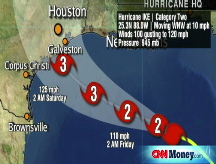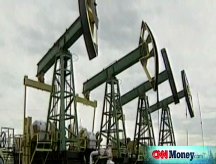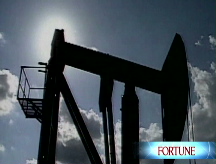Oil settles below $101
Crude futures are at their lowest point in 5 1/2 months as the market dwells on global economy, stronger dollar. Hurricane Ike threatens oil on Texas Gulf Coast.

NEW YORK (CNNMoney.com) -- Oil prices fell to a 5 1/2 month low Thursday, testing the $100-a-barrel mark, as the market remained focused on slumping demand and the stronger dollar while watching the threat Hurricane Ike poses to the Texas Gulf Coast.
U.S. crude for October delivery settled down $1.71 to $100.87 a barrel as floor trading ended in New York. It was the lowest settle price since March 24, when oil ended the day at $100.86.
Oil fell as low as $100.10 during trading.
Demand: Crude prices have fallen $45 from the record-high of $147.27 a barrel, set July 11, as the weakening global economy crippled demand for pricey energy. "The market has a very weak undertone. It is worried about global demand coupled with ample inventories," said Andrew Lebow, a broker at MF Global in New York.
There is "concern over the near-term economic outlook and the intermediate economic outlook," said Lebow. "If the economy struggles, obviously, demand for petroleum will be negatively impacted."
The concern over falling demand is not limited to the U.S. "Traders are worried about falling demand in Europe, South America and even Asia," said Lebow. "And Asia has really been the engine of any demand growth." With demand in a free fall, oil producers decided to curb overproduction.
On Wednesday, the Organization of the Petroleum Exporting Countries announced that it would return to oil production levels from last September, about 28.8 million barrels of oil a day. Given that OPEC member countries have been overproducing, ignoring established quotas, the move by OPEC to adhere to those allotments means a decline of roughly 520,000 barrels of oil per day.
On Wednesday, U.S. light sweet crude for October delivery settled down 68 cents to $102.58 a barrel, the lowest closing price since April 1.
Tipping point: One analyst said the $45 drop in crude prices, coupled with fresh concerns over the financial sector, could invite investors back into the oil market. "Demand has continued to fall, but the price has continued to fall, too," said Tom Orr, director of research at Weeden & Co. "You reach some point when that starts to even out."
Given that oil "has gone from $147 to $102, you may be at a position to get a little bounce back," said Orr. The $100 mark is a "tipping point" for the psychology of the oil market, he said.
Lehman Brothers (LEH, Fortune 500) reported a third-quarter loss of close to $4 billion and Goldman Sachs (GS, Fortune 500) downgraded the beleaguered stock to "neutral" from "buy." The bank's problems added fresh worries to market's financial sector concerns, and weighed on stocks Thursday.
"Some of the people that piled into the financials are probably getting back out of them and looking at the commodity trade," said Orr.
Hurricane Ike: Ike was upgraded to a Category 2 storm, according to the National Hurricane Center, and "is forecast to become a major hurricane prior to reaching the coastline," the Center said. The oil market watches storms in the Gulf closely because production facilities in the region account for about a quarter of U.S. crude oil production.
The Center said that with Ike moving over central and western Gulf of Mexico waters Thursday and Friday, the storm's center will approach the northwest Gulf of Mexico coast late Friday. Forecasters say the storm is on track to hit the Texas coast, south of Galveston.
However, oil prices did not spike as Ike swirled in the Gulf, because Ike was not headed for Gulf crude oil rigs. "We are missing the crude production areas and aiming for Refinery Row along the Texas Gulf Coast," said Lebow.
Texas is home to 26 refineries, which can process almost 4.8 million barrels of crude per day, or one-quarter of the nation's total refining capacity, according to the Department of Energy. Most of Texas' refineries are along the Texas Gulf Coast ports - Houston, Port Arthur, and Corpus Christi.
The region was working to restart production after Hurricane Gustav slammed Louisiana on Labor Day. However, with Ike approaching and gaining strength, oil and natural gas producers in the Gulf of Mexico have stopped sending workers back to the platforms, according to the Minerals Management Service (MMS).
The government agency, which tracks offshore operations, estimated that 562 of the 717 manned production platforms - about 78.4% - remained evacuated in the wake of Gustav and in advance of Hurricane Ike.
"It does not appear that [Ike] will be particularly damaging to production facilities," said Orr. "Unless you get really a direct center hit, there isn't much meaningful damage. There may be some supply disruption."
As of Thursday at noon ET, 95.9% of crude oil production and 73% of natural gas production in the Gulf of Mexico was shuttered, according to the Department of Energy.
Shell said that plans to shut down its Deer Park refining operations ahead of Ike, but it also said that it will maintain utilities to allow a "quick restart when weather conditions are safe to resume operations," according to a written statement on the company's Web site. The company's Motiva refinery will keep working, but at reduced rates.
Special trading session: In anticipation that Ike will rock the oil futures market, the Chicago Mercantile Exchange announced that it would hold a special, additional electronic trading session.
Globex trading for oil will begin on Sunday at 10 a.m. ET with a 9:30 a.m. pre-open. Typically, electronic trading on Sunday begins at 6 p.m. in time for early trading in Asia.
Retail gas prices: Even as crude oil prices ticked lower, gas prices at the pump increased for the second consecutive day, according to the Web site for motor advocacy group AAA. In some states where gas supplies depend on Gulf coast crude supplies, gas prices increased by more than they did nationwide.
The average price of regular unleaded gasoline increased 0.3 cent to $3.671 a gallon on a national level. In Texas, the projected landfall for Ike, gas prices jumped 0.5 cent to $3.537 a gallon. In Alabama, gas prices jumped 0.7 cent to $3.628 a gallon. In Arkansas, gas jumped 0.5 cents to $3.577 a gallon.
Robert Calmus from Marathon Oil (MRO, Fortune 500) said several of its Midwest refineries, which process crude oil into gas, were working on partial capacity because Gulf Coast crude delivery has not recovered to pre-Gustav levels.
While retail gas prices ticked up slightly, wholesale gas prices - the prices paid by gas station operators to suppliers - jumped $1.50 a gallon on the Gulf Coast wholesale market.
The price rose to $4.75 a gallon Thursday afternoon from $3.25 Wednesday, according to Tom Kloza, the chief oil analyst for Oil Price Information Service, an independent publisher that follows wholesale and retail fuel prices in North America.
The spike in wholesale prices will mean more pain at the pump for consumers, especially for those regions served by the Gulf Coast wholesale market. But Kloza said that given the oddity of the current situation, he does not expect prices at the pump to jump nearly as drastically as wholesale prices. ![]()






